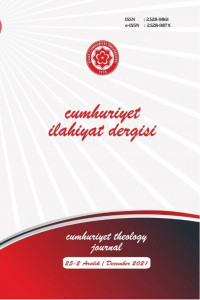Kelâm İlminin Yeniden İnşası Bağlamında Fazlur Rahman’ın Kelâm Eleştirisi
Fazlur Rahman’s Criticism of Kalâm in the Context Of Reconstructing of the Scien-ce of Kalâm
Author(s): Saadet AltaySubject(s): Theology and Religion, Islam studies
Published by: Cumhuriyet Üniversitesi İlahyat Fakültesi
Keywords: Kalâm; Criticism of Kalâm; Fazlur Rahman; Islamîc Thought; Modernism;
Summary/Abstract: The science of Kalâm, expressed as Uṣûlü'd-dîn in Islamic thought, is a constructional science. This means that the science of Kalâm has a dynamic structure in social life as well as a theoretical beginning. Kalâm has played an important role in the implementation of the idea of tawhid and the justice-based life that will accompany it by taking into account the historical and geographical heritage of Muslim communities on how to understand the hopes of religion. It is known that the political and social events that took place in Muslim society also took place in the history of Islamic thought as a theological sect in the later historical process. Muslims, part of a geography that has historically been the source of ancient cultures and thoughts, tried to protect the basic hopes of the religion they belonged to while also responding to the accusations of members of different faiths against Islam. Like other Islamic sciences, the science of Kalâm was formed later as a discipline. Depending on the method followed in understanding religious thought, theological sects were formed. Two basic approaches are dominant in the historical process and the general practice of the Muslim society. There is a rational trend that tends to use ta'wil to understand the verse based on nass and those qualified as Ahl-i hadith that do not accept ta'wil except for narration. The supporters of this method will later be described as Mu'tazila. There are dozens of theological sects shaped around these two basic ideas. This historical use of kalâm is rife with contradictions. They take a serious attitude towards those who use the kalâm method of the Ahl-i hadith. Although this is the case, the science of Kalâm as a discipline has played a very fundamental role in the Muslim society from the very beginning to the present. Unfortunately, the constructive function of the Science of Kalâm historically has not been continuous. As in other Islamic sciences, the Science of Kalâm became after a certain time a form of repetition or interpretation of what was written in the past, with commentaries and annotations instead of original copyright works. This naturally caused the Muslim community to imitate the past in every aspect of life and thus not be able to build a future. Muslim scholars have tried to address this over time and across geographies. A part of this early effort was the necessity of reinterpreting Islamic sciences. In the modern period (19th-20th century), a search for innovation has been made in all Islamic sciences. The main purpose of these efforts was the re-evaluation of Islamic sciences in accordance with the conditions of the age. One of those who was a part of this important and meaningful struggle is Fazlur Rahman (d.1988). He criticizes the science of Kalâm as well as other Islamic sciences and make suggestions to make Kalâm gain a dynamic structure. While Fazlur Rahman's criticism of Kalâm is included, the early period criticism of Kalâm will also be briefly mentioned in order to provide a better understanding of the subject. A comparison will be made between the thoughts of those who criticized Kalâm in the early period and those of Fazlur Rahman in the modern period. While there is an opposition to Kalâm in the form of the rejection of the science of Kalâm as a discipline, especially in the thought of Ahl al-Hadith, the science of Kalâm was considered as a constructional science in Fazlur Rahman. In addition to arguing that the Science of Kalâm should be reorganized as a discipline in terms of the method and content, Fazlur Rahman emphasizes the necessity of considering the past as an experience that must be understood according to the conditions of the day. For Fazlur Rahman, one of the reasons made Muslim thought inert is because the discipline of Kalâm does not consider present social life. In the 20th century, with modernism, theological debates gained a new dimension, and developments in all areas of social life gave birth to a brand new culture very different from the past. As a result of this, new value judgments have been formed to revisit and criticize the culture and values of the past.
Journal: Cumhuriyet İlahiyat Dergisi
- Issue Year: 25/2021
- Issue No: 2
- Page Range: 853-874
- Page Count: 22
- Language: Turkish

